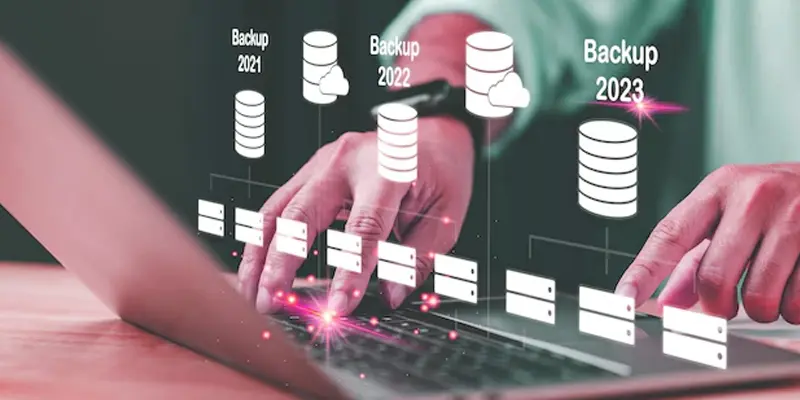DBMS Tutorial | Your Complete Guide to Database Management System
Published: 14 Oct 2024
Complete DBMS Tutorial for Absolute Beginners
Our DBMS Tutorial covers both basic and advanced topics related to database management systems. It is crafted to benefit beginners as well as professionals looking to enhance their skills.
A database management system (DBMS) is an effective software tool for managing, organizing, and retrieving data from databases.
This tutorial covers key topics such as an introduction to DBMS, its types, components, applications, and characteristics, as well as the advantages and disadvantages of DBMS, and much more. Whether you’re a beginner or looking to deepen your knowledge, this tutorial provides valuable insights for everyone. Let’s get started!
What is a database in DBMS with examples?
A database is an organized collection of data that has been saved to facilitate easy access, management, and updating. Think of it like a digital filing system where you can store names, phone numbers, or any kind of data in an organized way so you can find and use it whenever you need it. Databases are used everywhere, from websites to apps, to help store and manage data efficiently.
Examples of Database Systems
Examples of databases include a school system that stores student information like names and grades, a bank that keeps track of customer accounts and transactions, or an online store that manages product details, prices, and customer orders. These databases help organize and retrieve information quickly and efficiently.
| DBMS tutorial for beginners step-by-step |
|---|
Simple Tutorial on Database Management Systems for Students
Software called a Database Management System (DBMS) aids in managing, organizing, and storing data in databases. It makes it easy to add, update, delete, and retrieve data while keeping it secure and well-organized. Think of it as a tool that helps businesses or organizations handle large amounts of information efficiently and safely.

Why learning DBMS is Important for IT and Computer Students
Learning Database Management Systems (DBMS) is important because data is a crucial part of modern business and technology. As organizations collect and generate vast amounts of information, understanding how to manage this data effectively becomes vital. A DBMS provides the tools to store, organize, and retrieve data efficiently, allowing businesses to make informed decisions, improve operations, and enhance customer experiences. By learning DBMS, you gain valuable skills that are in high demand in various fields, including data analysis, software development, and information technology.
Additionally, mastering DBMS helps you understand key concepts such as data integrity, security, and relationship management, which are fundamental for working with data. It equips you with the ability to design databases, run complex queries, and ensure that data is accurate and accessible. Whether you aim to pursue a career in database administration, data science, or software engineering, knowledge of DBMS will significantly enhance your capabilities and open up a range of job opportunities in today’s data-driven world.
Career Opportunities After learning DBMS
The rise of modern technologies such as big data, cloud computing, and the Internet of Things (IoT) has significantly increased the demand for professionals skilled in Database Management Systems (DBMS). Almost every leading organization is seeking IT experts who have solid experience in managing databases effectively.
| Here are some job roles you can pursue after gaining knowledge in DBMS: |
|---|
|
Who can learn DBMS and how it helps in Real | World Projects
Anyone interested in working with data should consider learning Database Management Systems (DBMS). This includes students pursuing degrees in computer science, information technology, or data science. Professionals looking to advance their careers in fields like software development, data analysis, or business intelligence will also benefit from DBMS knowledge. Additionally, business owners who want to understand how to manage their data effectively can gain valuable insights by learning DBMS.
Real | life uses of database management systems in daily life
DBMS is used in various areas, including railway reservation systems, banking, social media sites, and online shopping, among others. It is essential to the effective management and organization of data across different applications, improving user experiences and guaranteeing seamless functioning.
Railway Reservation System
A railway reservation system is an online tool that allows travelers to book train tickets quickly and easily. It lets users check train schedules, select their seats, make payments, and manage their bookings, such as cancellations or changes. This system streamlines the entire ticketing process, making train travel more convenient for everyone.
Banking
Banking involves managing money and financial transactions through various services like saving, withdrawing, and transferring funds. Modern banking systems use technology to securely store customer information, process transactions, and offer online services, making it easy for people to handle their finances anytime and anywhere. This convenience helps customers manage their money effectively and stay informed about their accounts.

Online Shopping
Online shopping allows people to buy products and services over the internet from the comfort of their homes. Shoppers can browse through various items, read reviews, compare prices, and make secure payments easily. This convenient way of shopping saves time and offers a wide range of choices, making it popular among consumers.
Social Media Sites
Social media sites are online platforms where people can connect, share, and communicate with others. In addition to posting updates, sharing images and videos, and interacting with friends and family through likes, comments, and messages, users can also establish profiles. These sites help people stay connected and share their lives with a larger community.
Credit Card Exchange
Credit card exchanges refer to the process of transferring money or making payments using a credit card. This allows consumers to buy goods and services without needing cash upfront. When a purchase is made, the credit card company pays the seller, and the cardholder agrees to pay back the amount later, often with added interest.
Conclusion About Why DBMS is Important in Today’s Digital World
DBMS Tutorial provides a solid foundation for understanding database management systems. It gives you the information and abilities required to manage data in a variety of applications by covering both fundamental and advanced topics. Whether you’re just starting out or seeking to enhance your skills, mastering DBMS concepts can unlock exciting career opportunities in today’s data-driven landscape. We hope this tutorial has helped you gain valuable insights into the importance and functionality of DBMS.
FAQS – Data Base Management System Notes
Some databases like MySQL and PostgreSQL are free to use. Others, like Oracle or Microsoft SQL Server, may charge based on usage, features, or licenses.
If you’re just starting, go with MySQL or PostgreSQL—they’re free, powerful, and easy to learn. For big data or flexibility, NoSQL databases like MongoDB can be a good choice.
MySQL is one of the best for beginners because it’s easy to use and widely supported. SQLite is also great for learning without needing a server.
The full form of DBMS is a Database Management System.
A database view is a virtual table showing data from one or more tables but not storing it. It allows users to see specific information without affecting the actual data in the database.
The WHERE clause is used in SQL to filter records. It helps you select only the rows that match a certain condition.
Yes, SQL is one of the easiest languages to learn even if you’ve never coded before. It uses simple words like SELECT, FROM, and WHERE.
NoSQL is great for flexible and fast-growing data, like social media or big files. But SQL is better for structured, consistent data like banking or inventory systems.
Not always. Small apps or games may work without a database, but most apps that store user info need one.
Choose MySQL if your data is organized in tables and needs relationships. Choose MongoDB if you want to store flexible, unstructured data like user profiles or blog posts.

- Be Respectful
- Stay Relevant
- Stay Positive
- True Feedback
- Encourage Discussion
- Avoid Spamming
- No Fake News
- Don't Copy-Paste
- No Personal Attacks

- Be Respectful
- Stay Relevant
- Stay Positive
- True Feedback
- Encourage Discussion
- Avoid Spamming
- No Fake News
- Don't Copy-Paste
- No Personal Attacks





